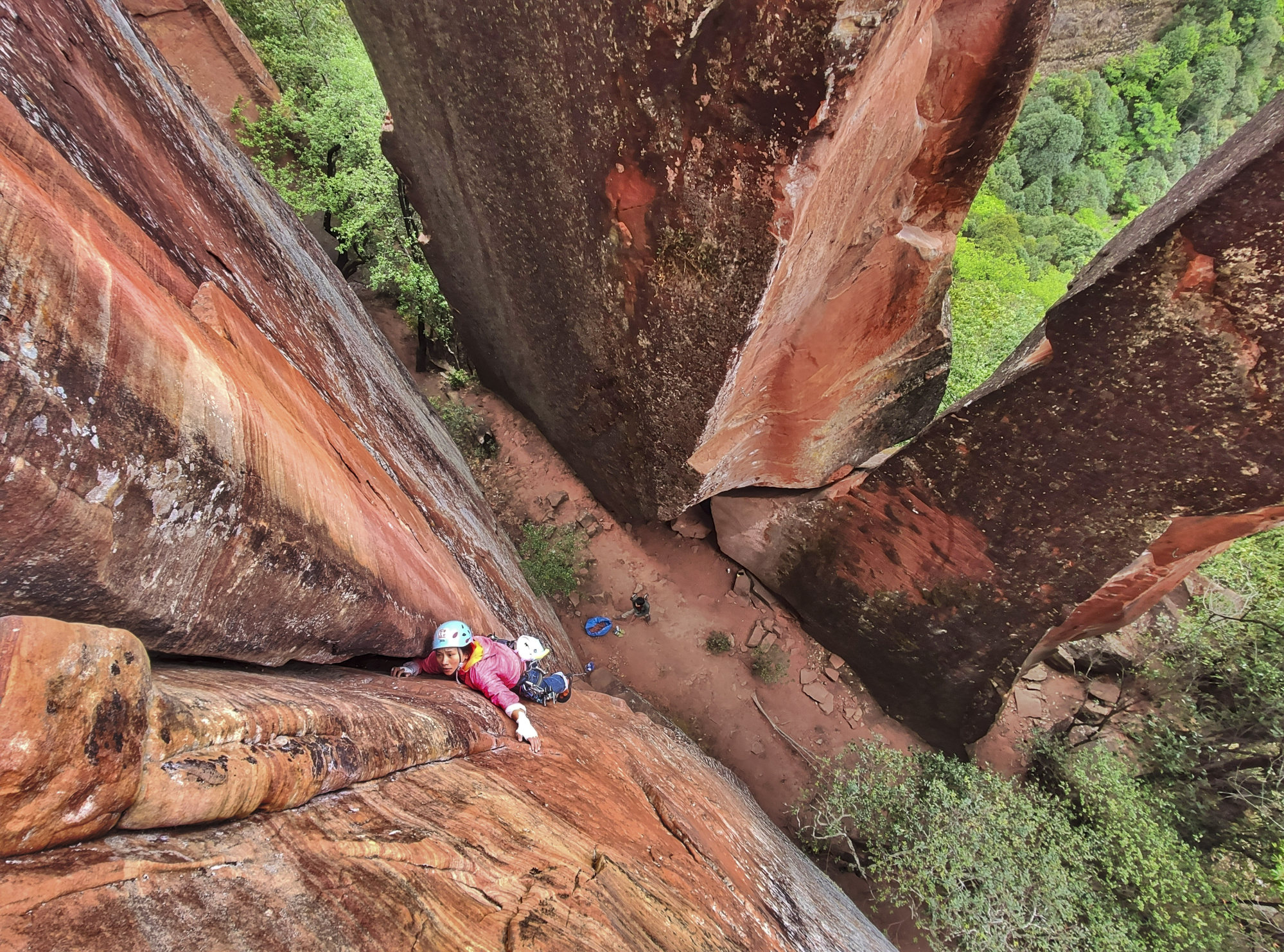
From cook to elite climber: a Liuzhou native’s rise from ‘making rice balls and killing salmon’ to becoming one of China’s best
- Lu Chunfeng’s nearly decade-long journey has taken her from making snacks in a karaoke bar to joining the ranks of China’s elite athletes
- No stranger to hardship, Lu says the happiness she finds in climbing is more important than any material possessions
Climbing is fast becoming one of China’s most popular sports, and hundreds of climbing gyms have sprung up in first-tier cities where white-collar professionals can afford the membership and the equipment, which can be more expensive than in Europe.
But climbing is not just the preserve of the nation’s more affluent urbanites, and one of the country’s best female climbers is a cook from Liuzhou, in the Guangxi Autonomous Region.
Lu Chunfeng, or Xiaolu to her friends because of her small stature, first discovered climbing almost a decade ago. Now, Lu is an elite climber who not only makes a living from the sport, but is aiming to climb a 5.14 difficulty grade cliff that only three women in China have achieved.

Guangxi has an abundance of limestone cliffs, and in 2013 the 28-year-old’s friends took her climbing. “I was not really afraid, but I was a little chubby, I have never done any sports before,” she says. “I thought climbing was really fun, but I did not expect to keep it up for long.”
One day, Lu froze with fear, too afraid to commit to a difficult move, but “once I did it … this feeling of achievement … wow, I can do this!”
From then Lu was hooked, but her job, which involved finishing late at night and working weekends, was getting in the way of climbing. “I was working in the kitchen of a karaoke bar, making snacks,” she says.
I do not have big material demands. Having enough to eat, being warm enough, that’s all you need
Although she was improving as a climber, to become even better, Lu realised she had to climb full time. So, seven years ago she quit her job, entrusted her son to the care of the family, and left for the mecca of Chinese climbing – Yangshuo.
“I am the kind of person that just decides,” Lu said. “I find a way to do what I want to do. Everyone in my family understood and supported me.”
With no savings, and no desire to have a job that would get in the way of her climbing, Lu opened a street stall in Yangshou selling home-made dumplings. She earned about 1,500 yuan a month, and shared a flat with two other climbers.

One of her housemates was Tony Cheung, a Hong Kong climbing videographer. “She worked very hard to earn money to live – in order to climb,” says Cheung, who made a short film about Lu called, From Dumplings to Rock.
“If she wants something, she focuses on it and succeeds at the end. She is not afraid of hardship,” Cheung adds.
But Lu does not consider this hardship. “I have three brothers, and when I was little our parents went to work in Guangdong,” she says. “Our grandmother brought us up. Our family was poor, in the evening we sometimes had two boiled eggs between four kids to eat. After this, I do not have big material demands. Having enough to eat, being warm enough, that’s all you need.”

It turns out that for Lu, actually all she needs is “the happiness you get from climbing – no material things can ever give you that”.
Sustaining herself with dumplings and climbing every day, Lu got better and better. In Yangshuo, she completed two 5.13d routes – White Devil and Paper Cut. The next step was the coveted 5.14 difficulty grade, the true mark of an elite climber.
In 2016, Lu returned home to Liuzhou and took a job in a sushi restaurant, making “rice balls and killing salmon”. She did that for a year, fitting in climbing as much as she could.
The following year she started competing. Climbing competitions, with prize money, are booming in China, with separate categories for amateurs and professionals like Lu.
Her success meant that by 2019 she had a sponsor who covered her equipment and financed climbing trips.
In November this year, Lu entered a competition in Chongqing where the prize for winning was 10,000 yuan. But before that, she had a climbing trip to Liming in Yunnan province where red sandstone walls are splintered by long cracks.
Before the coronavirus pandemic, climbers from all over the world would travel to the area to climb these cracks, in a style known as traditional climbing, or “trad”.
In sport climbing, routes are equipped with bolts drilled into the rock. The stakes are much higher in trad – a climber places removable protection inside the cracks in the rock that must hold the force of a fall. In trad, mental strength is as important as athleticism, and many sport climbers never make the transition.

Lu climbs “hard trad”. In Liming, the only woman in the group, she was the “rope gun”, the strongest climber who goes up first. This time she went with a goal – to do a difficult route called Japanese Cowboy.
This route is especially challenging for the diminutive Lu – it is wide, with an overhanging crack in a smooth wall. Such cracks are climbed by jamming hands, fists, and feet inside and torquing on them to move upwards. Lu’s limbs, however, are too small to jam in the wide crack.
Despite repeated attempts, she could not conquer the route, and has vowed to return next season after working on her technique.
Three days after failing on Japanese Cowboy, Lu came second in the competition, her best result as a professional. It came at a cost, two weeks of non-stop trad climbing and then a competition blew out her shoulder.
Lu has goals for the year ahead. As well as becoming the fourth Chinese woman to climb 5.14 difficulty, she wants to do an extremely hard route called Black Hole in Liming, something she does not think “a Chinese girl has done yet”.
But for the cook from Liuzhou her biggest achievement is not in the climbing, it has been in Zhao dao zi wo or “finding myself”.


